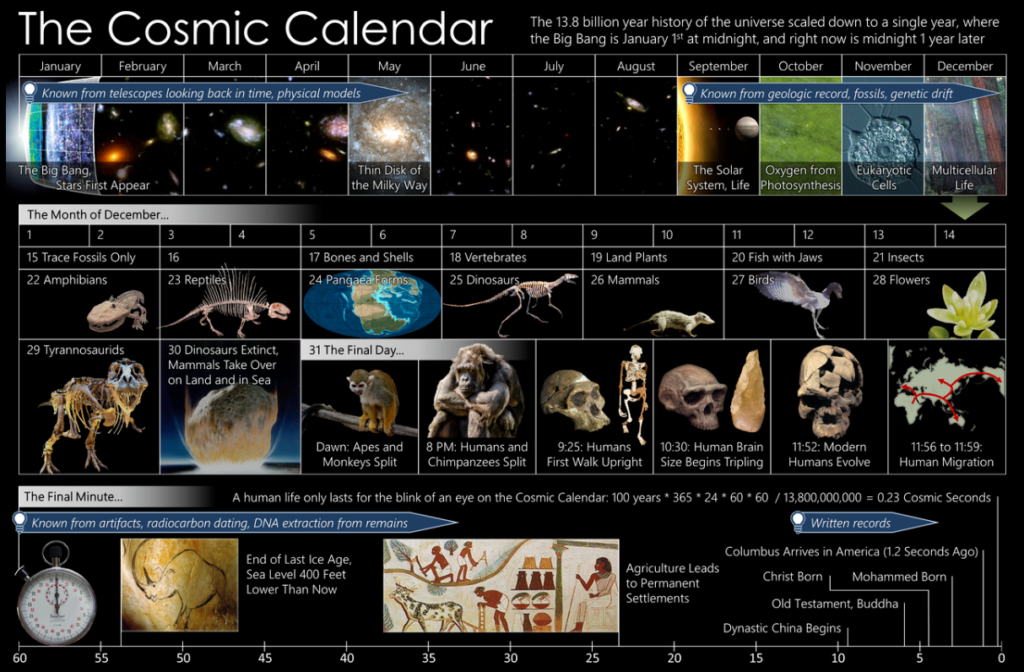One of the most useful ideas that I’ve ever come across is the idea of framing.
I think in terms of a ‘universe frame’…14 billions years ago to the present (I know the universe is closer to 13.7 or 13.8 billion years old but 14 allows me to divide it in half repeatedly a little easer; I like whole numbers. lol)
Then, I think of a ‘humanity frame’. Current anthropological evidence indicates that humanity arose in Morocco about 300,000 years ago so my ‘humanity frame’ starts at 300,000 years and goes to 0 at the present.
Then, I think in terms of my ‘life frame’. Based on current statistics I’m guessing that I will live 80 years total so this extends from my birth date in 1978 to my ‘death date’ in 2058.
Thus, I place my ‘life frame’ in context of my ‘humanity frame’ and in context of my ‘universe frame’.
This gives me an incredible perspective on how short life is and also how little time I have left.
As you guys know from reading my posts in the past, I think of time in terms of repeated physical events.
Thus, as of this writing I only have 36 Sun Orbits left. That’s it.
I also only have 13,140 Earth Rotations left! Crazy.
I’m gonna make them count and create something beautiful for the world and for myself.
Additionally, I also like to contextualize myself in term of ‘ALL humans’.
Current anthropological estimates indicate there have been 100 billion humans so far.
How many different ways of approaching the world have there been?
How different would I be if someone with my exact genetic code was spawned into existence in the spatial location of modern day Mali 67,655 years ago?
How much do I really know about what it means to be human from my massively limited perspective of 44 years from 1978 to 2022 in the United States?
It’s humbling.
Along these lines, something that really changed my life when I came across it year ago in Carl Sagan’s work was the Cosmic Calendar.
He basically took the entire history of the universe and compressed it into a 1 year calendar.
Here’s an updated version of that based on the most up to date data.

Once you see things from this perspective, it becomes almost silly when someone says The Beatles were ‘back in the day’.
In fact, Mozart is virtually temporally identical with us and so is Aristotle and so is the invention of writing and so is the invention of agriculture and so is the first freaking human!
A cosmic perspective literally changes everything.
Of course, we can also view this from the other direction.
The temporal duration of the universe is the longest know time, so what is the shortest?
Answer: the Planck time (it’s one major candidate, at least).
It is the smallest known unit to have any physical meaning and is the time it takes light to travel one Planck length.
Again, remember to focus on physical events. That’s what I love about the Planck time.
Anyway, stated in terms of seconds the Planck time has this temporal length 5.39×10−44.
So, as opposed to cosmic time we can now view things from the Planck time perspective and realize that I have an almost uncountably large number of Planck times left before I die (we can count them by mapping each Planck time to the set of natural numbers; see Discrete Mathematics for counting as mapping to the set of natural numbers).
So, which perspective is right…the Cosmic time perspective or the Planck time perspective?
Answer: They are both right! They are just framed differently.
This brings us to one of the most fundamental ideas of human thought….’comparison’.
What simple actions did I perform?
Well, I determined the largest possible time and then I determined the smallest possible time (approximately for both).
Then, I determined my own amount of time based on modern statistics.
Next, I compared my amount of time with the largest amount of time.
Then, I compared my amount of time with the smallest amount of time.
Each comparison gave me new insights and therefore each one is useful.
Additionally, I’ve also consciously acknowledged that I am making such comparisons.
This gives me immense power because now I can change my point of comparison and see what I can learn.
So, what about comparing myself to something more in the middle? Something in between Cosmic time and Plank time?
How about humans born in ancient Rome?
If we specifically look at children who survived to the age of ten, then an ancient Roman could only be expected to live to be around 30. (see study below)
“For instance, the Harkness’s study, based on the inscriptions contained in the Corpus of Latin Inscriptions, reported the following average age at death in those who survived up to the age of 10 in various regions of the Roman Empire: Rome (29.3), Latium (29.6), Cisalpine Gaul (32.1), Bruttii, Lucania, Campania, Sicily and Sardinia (33.7), Calabria, Apulia and Samnium (34.8), England (36.5), Asia and Greece (36.8), Aemilia, Etruria and Umbria (37.1), Spain (37.8), and Africa (53.3). This early report highlighted the wide heterogeneity of mortality in the different parts of the Roman Empire and, specifically, the relatively longer life span in Sardinia compared with Rome itself.”
From this perspective, I’ve already had an incredibly fortunate life.
And, speaking of life, someone who has had a huge impact on my thinking here is Daniel Kahneman.
He suggests that we think in terms of ‘broad framing’ where we model our whole life from beginning to end and prepare responses for the recurring problems that we will encounter consistently during out lifetime.
Let’s hear what Kahneman has to say…
Click here to buy Kahneman’s incredible book Thinking Fast and Slow
I like to think in terms of ‘what will I encounter ALL days?’, ‘what will I encounter MOST days?’, ‘what will I encounter NO days?’, etc.
We can use any combination of quantifiers and negations that we want.
For example, what will I encounter ALL days vs. not-ALL days.
It seems like good thing to focus on first is something you will encounter ALL days.
That is why my Day Frame is so important to me. https://www.lostfalco.com/lostfalcos-day-frame/
It gives me a pattern for what I will do each day and allows me to fit things in around that pattern.
Use my frame as a template for yourself, adjust it to your own needs, and try it out!
There is nothing more fundamental than optimally ordered time.
Until next time, LF out.
https://www.ncbi.nlm.nih.gov/pmc/articles/PMC7785213/
Does the longevity of the Sardinian population date back to Roman times? A comprehensive review of the available evidence
Abstract
The discovery early in this century of the exceptional longevity of the Sardinian population has given new impetus to demographic studies of this phenomenon during the classical period. In the 1970s, it was hypothesised that the average mortality rate in Roman Sardinia was lower than in metropolitan Rome itself, postulating an ancient precedent for the remarkable longevity observable nowadays in the island’s population. In the present study, the available evidence was examined in order to test this hypothesis. Literary, juridical, epigraphic, papyrological, anthropological and archaeological sources regarding the population of the Roman Empire, including Sardinia, were retrieved by accessing Science Direct, PubMed, Scopus and Google Scholar databases, as well as regional libraries, regardless of time limitation, and were independently reviewed by the authors. For Roman Sardinia, only funerary epitaphs were retrieved, in contrast with the numerous sources available for the whole Roman Empire. Inscriptions revealing the existence of three alleged nonagenarians, two centenarians, two ultracentenarians and one supercentenarian were found, corresponding to 2% in a total of 381 inscriptions. The majority were located in a highly Romanised rural area of central-western Sardinia. However, the ages reported in the epitaphs may be inaccurate because of the influence of confounders such as age rounding, approximations and/or amplifications, and are unrelated to the total number of inhabitants. In conclusion, the funerary evidence, the only available data from Roman Sardinia, is too weak to estimate the life expectancy of the local ancient population and cannot offer valuable arguments to support the hypothesis that exceptional longevity has been a Sardinian trait since Roman times.

Leave a Reply
Your email is safe with us.